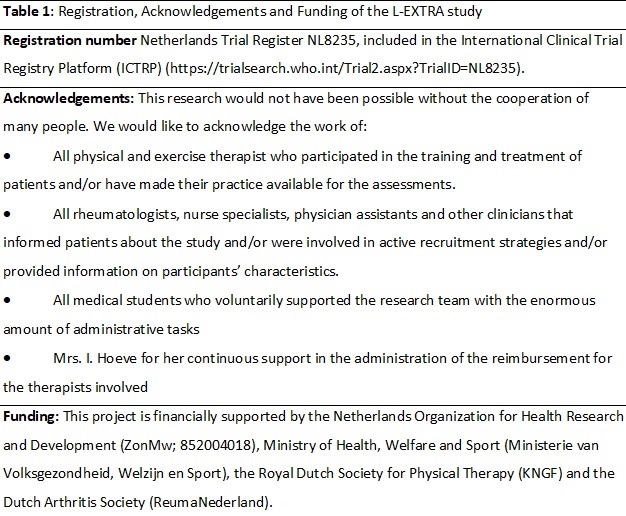Session Information
Session Type: Poster Session B
Session Time: 9:00AM-11:00AM
Background/Purpose: Supervised exercise therapy is an effective and safe treatment option for people with rheumatoid arthritis (RA). However, most studies involve interventions of relatively short duration (≤12 weeks) or in patients with stable disease and a favorable health status. Patients with persistent disease activity, irreversible joint damage, multiple joint replacements and/or severe comorbidities are underrepresented in research, although in particular patients in this subgroup might be in need of exercise therapy, most likely longstanding. However, studies on longstanding exercise interventions in this subgroup are lacking. Therefore, this study aimed to evaluate the effectiveness of longstanding personalized, supervised exercise therapy compared with usual care in people with RA and severe functional limitations.
Methods: Adults with RA and severe limitations in basic activities of daily living were randomized 1:1 to longstanding ( >52 weeks) personalized, supervised exercise therapy or usual care. The intervention consisted of exercise therapy tailored to individual goals, combined with self-management support to increase physical activity and fitness levels, and was delivered by specifically trained, primary care physical/exercise therapists. The primary endpoint was the change in the Patient-Specific Complaint (PSC (0-10)) at 52 weeks. Secondary endpoints included the Health Assessment Questionnaire-Disability Index (HAQ-DI), Rheumatoid Arthritis Quality of Life questionnaire Patient (RAQoL), 6-minute walk test (6MWT), Patient Reported Outcome Measurement Information System-Physical Function-10 (PROMIS-PF-10) and the Short Form-36 (SF-36). Results are reported from the 52-week rater-blind treatment period using analysis of covariance, expressed as mean difference between change scores with the 95% confidence interval.
Results: 215 people (90% female, age 58.8 (SD; 12.9) years) with RA and severe functional limitations were randomized. At 52 weeks n=104 (intervention) and n=98 (usual care) participants were included in the intention-to-treat analyses. The improvement in the primary outcome (PCS) was statistically significantly greater in the intervention group vs usual care difference in change score between groups (mean [95% CI] -1.7 [-2.4 – 1.0]) at week 52. Except for the PROMIS-PF-10 and SF-36, all secondary outcomes showed statistically significantly greater improvements in the intervention group vs usual care group at week 52 (HAQ-DI 0.17 [0.05 – 0.29], RAQoL 1.97 [0.62 – 3.32], 6MWT 56 meter [38 – 75]) indicating consistent improvements across domains, with between-group effect sizes ranging from 0.4 to 0.9. No intervention-related (serious) adverse events were reported.
Conclusion: Longstanding, personalized, supervised exercise therapy was more effective than usual care after 52 weeks of treatment in people with RA and severe functional limitations. Improvements were consistently observed across domains.
To cite this abstract in AMA style:
Teuwen M, van Weely S, Vliet Vlieland T, van Wissen M, Peter W, den Broeder A, van Schaardenburg D, van den Hout W, van den Ende C, gademan M. Effectiveness of Longstanding Exercise Therapy versus Usual Care in People with Rheumatoid Arthritis and Severe Functional Limitations: A Randomized Controlled Trial (L-EXTRA) [abstract]. Arthritis Rheumatol. 2023; 75 (suppl 9). https://acrabstracts.org/abstract/effectiveness-of-longstanding-exercise-therapy-versus-usual-care-in-people-with-rheumatoid-arthritis-and-severe-functional-limitations-a-randomized-controlled-trial-l-extra/. Accessed .« Back to ACR Convergence 2023
ACR Meeting Abstracts - https://acrabstracts.org/abstract/effectiveness-of-longstanding-exercise-therapy-versus-usual-care-in-people-with-rheumatoid-arthritis-and-severe-functional-limitations-a-randomized-controlled-trial-l-extra/

